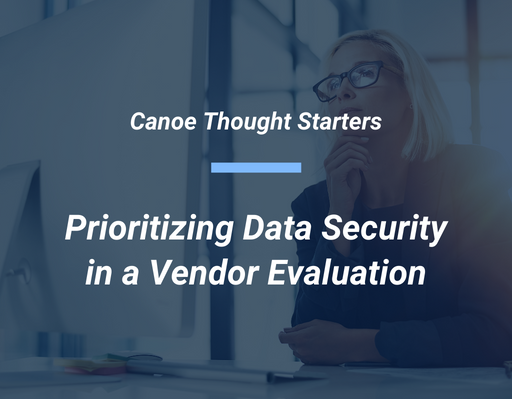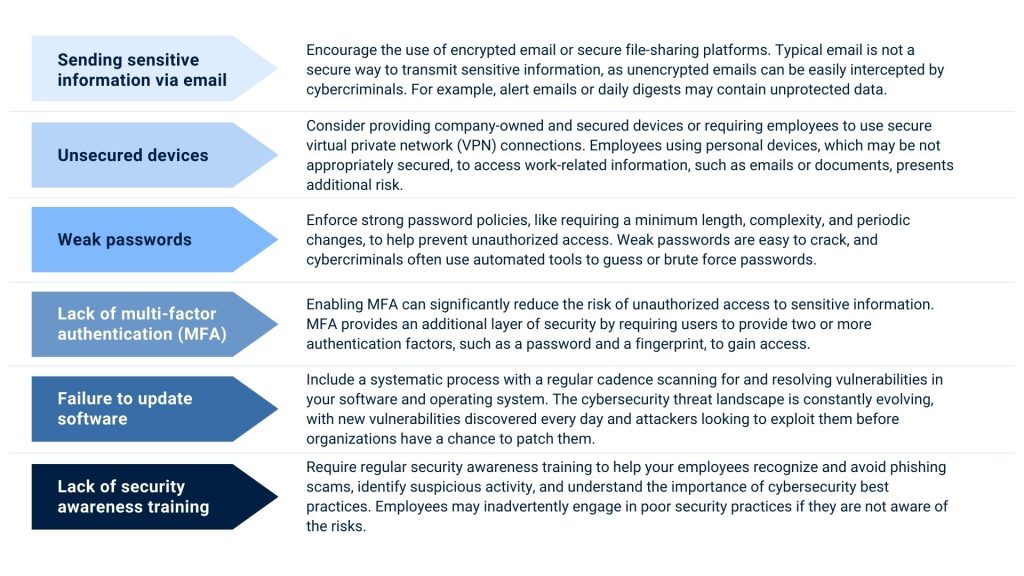8 Critical Considerations for Prioritizing Data Security in a Vendor Evaluation

Having a strong infrastructure in place to protect sensitive data should be a critical consideration for all firms, but for financial institutions specifically, the nature of the information in question can actually introduce even more risk. Risk management is a critical piece of the alternative investment process, and cybersecurity considerations are no exception.
As a provider to these financial institutions, financial technology companies with poor security standards can face serious consequences. For investment document and data management applications, the strength of a cybersecurity program is especially crucial as these solutions typically store sensitive and confidential information. Without proper security measures in place, there is a risk of data or documents being lost, accidentally deleted, or shared with unauthorized parties. The fallout can be significant, leading to larger challenges, including permanent data loss, interrupted business operations, and reputational damage.
This article identifies the types of security vulnerabilities alternative investors deal with when working with technology vendors and how to properly manage these risks, as explained through perspective offered by Canoe’s Technology Leadership Team.
“Canoe offers best-in-class enterprise technology solutions trusted by massive organizations, including some of the world’s largest banks. This trust results from developing and maintaining processes that ensure their sensitive information is secure. Our team invests in cybersecurity infrastructure to meet and exceed large established organizations’ stringent data requirements. Smaller clients also reap the security benefits of this structure,” said Kevin Winter, Canoe’s VP of Information Security.
Organizations that invest less in their cybersecurity standards can present considerable data security risks. Often, poor security practices can be easily fixed with some simple adjustments to policies, processes, training, and technologies. By addressing these vulnerabilities, organizations can significantly reduce the risk of a cyberattack and protect sensitive information.
Some examples of common poor security practices:

Market Position Threats: 3 Major Areas of Concern
Protecting Sensitive Data
The financial services industry is a prime target for cybercriminals, as these firms handle particularly sensitive data, including confidential financial statements and private investment information. Alternative investments, such as private equity or hedge funds, often have illiquid and concentrated holdings, meaning that a cybersecurity incident affecting one investment can have a significant impact on your overall portfolio. Hackers may try to leverage your data for financial fraud, ransom, or even attempt to access and transfer funds from client accounts directly. The cost of a breach is substantial; a single breach can cost your firm millions of dollars, including legal fees, regulatory fines, notification costs, and loss of business. Cyberattacks may also lead to service disruptions, reputational damage, and additional costs associated with remediating the causes of such attacks.
All in all, the potential for extensive losses far outweighs the cost of implementing and maintaining a robust information security program. Without a strong security infrastructure in place, your document and data management applications are at higher risk of a data breach, which can lead to this sensitive information being stolen or leaked.
Regulatory Requirements
Many regulations also require organizations to implement specific security measures to protect sensitive data. In the financial services industry, there are a number of regulations, such as the SEC’s Regulation S-P, that require wealth managers to have a strong information security infrastructure in place. Regulatory bodies like the SEC, CFTC, and FINRA mandate institutional investors’ compliance with specific security standards and controls to ensure the confidentiality, integrity, and availability of their data. Failing to comply with these regulations can result in legal action, hefty fines, and reputational damages. Alternative investments, in particular, are often less regulated than traditional investments. This lack of regulation may create additional cybersecurity risks, so it’s important to have strong internal controls and security measures in place. By building a strong information security program, you can help ensure compliance with these regulations, reducing your risk of legal and financial penalties.
Reputational Concerns
Reputation is everything in financial services, where clients entrust you with their most sensitive information. Simply put, investors expect you to protect their data from theft or breach. If your firm experiences a security incident of any kind, it can severely damage your reputation in the long term, leading to a loss of trust and, therefore, a loss of current and future investor funds. Once customers lose trust in your organization, it may be difficult to regain that trust even after implementing stronger security measures. The strength of your information security program can help prevent security incidents and demonstrate to clients that their data is being protected, further boosting investor confidence from the onset.
Our 8-point checklist for evaluating vendor security identifies the types of security vulnerabilities alternative investors deal with when working with technology vendors and how to properly manage these risks, as explained through perspective offered by Canoe’s Technology Leadership Team.
How Does Canoe Stack Up?
Our philosophy is that client data in the Canoe system must be more secure than it would be in the client’s ecosystem. Canoe has over 200 clients that trust us with their sensitive information. We take that responsibility very seriously and, thus, have implemented multiple layers of protection to ensure the safety and privacy of that data.
Canoe’s Technology Leadership Team (TLT) consists of six experienced individuals who also frequently consult with expert industry advisors. The technology organization is designed to promote collaboration while balancing separate concerns, enabling Canoe to deliver a thoughtfully-designed, secure, and useful product to our customers.
“Canoe is technology-reliant when it comes to document collection and data extraction. The benefits are many: from a cybersecurity perspective, a tech-enabled process is easier to manage than one that’s heavily manual. Our client base and its related document volumes power our shared intelligence, which enables a faster, smoother onboarding process while also promoting data accuracy. And, our portal coverage is extensive and well-established, further speeding up onboardings and time to data,” said Michelle Wilson, Canoe’s Head of Product.
Canoe’s commitment to providing a secure and trustworthy platform sets us apart from our competitors. For more on how Canoe stacks up against the 8-point checklist provided above, download our Data Security brochure.
Conclusion
The merits and consequences of implementing or not implementing a strong security infrastructure are clear. In summary, poor security standards can have serious consequences for both financial technology companies and their clients, including financial losses, data breaches, reputational damage, and legal liability. It’s extremely important for companies in this space to prioritize security and take all necessary measures to protect their clients’ sensitive information. Document and data management applications need to prioritize the protection of sensitive information, control access to their data, and comply with relevant regulations.